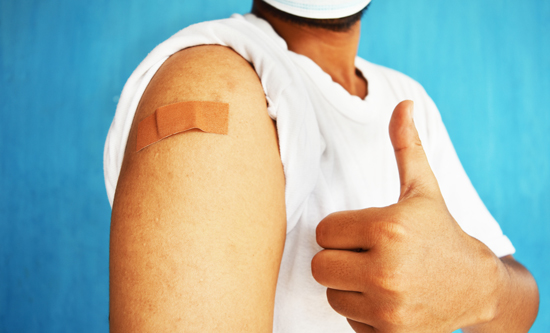
The Centers for Disease Control and Prevention (CDC) released new guidance for folks who are fully vaccinated.
Fully vaccinated people should wear masks indoors in areas of substantial or high transmission. If your county is orange or red on this map, wear a mask.
"The vaccines continue to be very effective in preventing severe illness, hospitalization and death due to the delta variant. However, we’ve seen a dramatic upswing in cases of Delta variant infection, including some vaccine breakthrough infections," explains infectious diseases expert Mark Rupp, MD. "Thus, the CDC has changed recommendations recently to advise that even fully vaccinated persons should wear a mask when in risky situations like shared indoor air."
What does fully vaccinated mean?
The vaccines take time to create protection against COVID-19. You're considered fully vaccinated either:
- Two weeks after you've had your second dose of the Pfizer or Moderna vaccines
- Two weeks after receiving Johnson & Johnson (Janssen) vaccine (this vaccine is only one dose)
If it hasn't been two weeks after your final dose, you're not fully vaccinated. Continue to mask up and keep 6 feet or more of space around people you don't live with.
Can fully vaccinated people stop wearing masks in public?
Fully vaccinated people are protected from a major illness or death due to COVID-19. However, there have been an increase of positive cases because of the delta variant. Due to this uptick of cases, it is still important to continue wearing a mask while indoors. The delta variant can infect more people and, sometimes, cause more harm. To prevent the spread of the delta variant, continue wearing a mask indoors.
"Many people in the community have been vaccinated and are now largely protected from this illness," says Dr. Rupp. "However, no vaccine is 100% effective. And some people who are immunosuppressed may not respond to the vaccine. So, it's prudent for some to continue to wear masks and physically distance themselves.”
People are still required to wear a mask on planes, buses, trains and other means of public transportation. That means airports and bus stations, too. Everyone – vaccinated or not – should still wear a mask in hospitals, clinics, long-term care facilities, prisons, jails and homeless shelters. And you'll need to follow any local mask mandates, including business or workplace guidelines. (All patients, visitors and staff are still required to wear a mask when inside Nebraska Medicine hospitals and clinics.)
"To get this pandemic behind us, we all need to do our part," Dr. Rupp explains. "Everyone should get vaccinated as soon as possible. Now that a COVID-19 vaccine is authorized for adolescents, we should get our 12 and up children vaccinated, too. Vaccinations mean kids can safely and confidently go back to full in-person school in the fall."
If you're not fully vaccinated yet, continue to:
- Wear a mask and social distance in public
- Avoid in-person gatherings
- Get tested if you experience COVID-19 symptoms
- Avoid domestic and international travel


